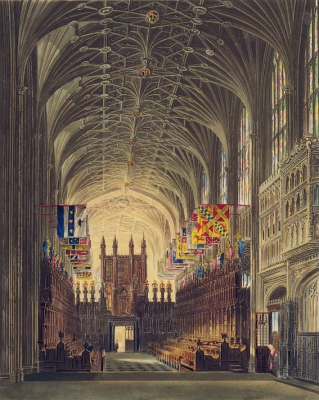Gospel in Art: Solemnity of Saint George, Martyr

Interior of St George's Chapel, Windsor Castle, from 'Royal Residences', engraved by Thomas Sutherland, published by William Henry Pyne,1819.
Source: Christian Art
Gospel of 28 April 2025
John 15:18-21
At that time: Jesus said to his disciples, 'If the world hates you, know that it has hated me before it hated you. If you were of the world, the world would love you as its own; but because you are not of the world, but I chose you out of the world, therefore the world hates you. Remember the word that I said to you: "A servant is not greater than his master." If they persecuted me, they will also persecute you. If they kept my word, they will also keep yours. But all these things they will do to you on account of my name, because they do not know him who sent me.'
Reflection on the aquatint
Saint George, widely venerated as a Christian martyr and the patron saint of England, soldiers, and scouts, lived in the late 3rd century AD in the Roman province of Cappadocia, present-day Turkey. Though little is known about his early life, tradition tells us that George was a Roman soldier who boldly declared his Christian faith and refused to renounce it, even under threat of persecution and death. The most enduring legend associated with him is that of his dramatic encounter with a fearsome dragon that was terrorising the city of Silene. In this tale, he slays the beast, rescues a princess, and inspires the conversion of the city's inhabitants to Christianity. While the story contains mythical elements, the enduring power of Saint George's witness lies in his unwavering faith, heroic courage, and noble self-sacrifice.
Though Saint George was not English and never set foot in England, his fame as a Christian martyr and dragon-slayer spread widely across Europe in the early centuries of Christianity. By the time of the Crusades (11th-13th centuries), devotion to him had become particularly strong among Christian knights and soldiers, who saw him as a heavenly protector in battle. It was during the Third Crusade (1189-1192) that King Richard the Lionheart is said to have placed his army under Saint George's protection, inspired by the saint's reputation for bravery and chivalry. By the 14th century, this devotion had grown significantly in England. The turning point came in 1348, when King Edward III established the Order of the Garter, England's highest order of chivalry, and chose Saint George as its patron. A chapel dedicated to him was built at Windsor Castle, and he was increasingly invoked as a national figure of Christian virtue.
Saint George's Chapel at Windsor Castle is one of the finest examples of Gothic architecture in England. Construction began in 1475 under the reign of King Edward IV and continued over several decades, with the chapel being completed during the reign of Henry VIII in the early 16th century. Built in the Perpendicular Gothic style, it features soaring fan vaulting and stunning stained glass windows. The chapel's grand Quire (choir stalls) is particularly notable for its ornate wood carving and heraldic banners, which represent the Knights of the Order of the Garter.
Saint George's Chapel is not only a place of worship but also plays a significant role in the life of the British royal family. The chapel is the setting for many royal occasions, including weddings, baptisms, and funerals. Notably, it was the venue for the weddings of Prince Harry and Meghan Markle in 2018, and Princess Eugenie and Jack Brooksbank later that same year. Several monarchs and members of the Royal Family are buried there, most recently, Queen Elizabeth II, making it both a royal mausoleum and a living place of prayer.
LINKS
Gospel in Art: https://christian.art/
Today's Reflection: https://christian.art/daily-gospel-reading/john-15-18-21-2025/ (with audio)


















